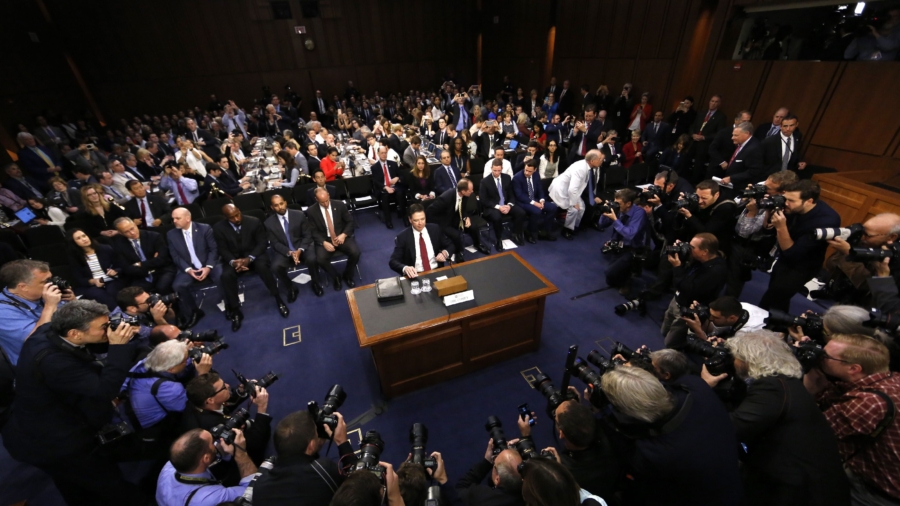The much-anticipated House Intelligence Committee memo was released on Feb. 2, and details how the Obama administration used unverified opposition research to obtain a series of FISA warrants to spy on Trump campaign volunteer Carter Page, beginning spy operations that likely expanded to include others on the Trump team.
Findings outlined in the memo show that former FBI and Department of Justice (DOJ) officials used the Trump dossier as their primary source to obtain spy warrants on the Trump team before and after the election, and withheld their knowledge from the Foreign Intelligence Surveillance Court that the dossier was paid for by the Democratic National Committee and Clinton campaign.
It also shows that Christopher Steele, the former British spy who compiled the dossier from Kremlin-linked sources, was working with the FBI and was fired for revealing to the media that he was working for the agency. In spite of this violation by Steele, his product, the dossier, continued to be used in applications for FISA warrants. In addition, Steele briefed a reporter at Yahoo News, and the Yahoo story was used as evidence to corroborate his dossier for a FISA renewal—despite the fact that sources for both were Steele.
The memo could have serious implications not only for the Russia investigation being led by special counsel Robert Mueller but also for the Obama administration officials who helped launch the investigation.
If FBI and DOJ officials lied to or knowingly misled the court to obtain their FISA requests, it’s possible they could face charges for perjury; and if the FISA warrants were obtained through unsound means, subsequent findings could be “fruit of the poisoned tree,” and the Russia investigation indictments may be thrown out.
A person commits perjury when he or she lies under oath, and according to Marc Ruskin, former FBI agent and author of “The Pretender: My Life Undercover for the FBI,” it’s possible to commit perjury when submitting an affidavit to obtain a warrant, such as a FISA request.
“The perjury has to do with the affidavit issue because you’re swearing under oath to the judge that this is true,” Ruskin said. “If they had reason to believe there was false information or material omissions in the affidavit then that would be perjury.”

The memo names several officials who signed off on FISA warrant applications, using the unverified Trump dossier as its main source. They include former FBI Director James Comey—who signed off on three FISA applications, former FBI Deputy Director Andrew McCabe, former Deputy Attorney General Sally Yates, and Deputy Attorney General Rod Rosenstein.
Comey described the Trump dossier as “unverified and salacious” in sworn testimony, yet still signed off on its contents. The memo notes officials were aware the Clinton campaign and the DNC paid for the dossier, yet withheld this information in their FISA requests.
According to Ruskin, the withholding of information is a red flag, but would need more investigation to determine whether the officials committed a crime.
“If you withhold the material fact or you make a material omission that misleads the court, that perhaps could be construed as perjury,” he said. “However, the question would be did they withhold material fact, and does the fact that the document was paid for by a campaign undermine its credibility.”
Whether the officials withheld the information knowingly is also important. Ruskin said, “If they didn’t have a basis for knowing the underlying facts were false, then it would be hard to make an argument that there was perjury and a crime.”
In response to Comey’s statement that the dossier was “unverified and salacious,” yet still signing off on it, Ruskin said it’s possible Comey could be accused of committing fraud under court.
“If he believed it’s unverified, the analysis you could put down is that Comey stated it was his belief that the dossier—and therefore the underlying facts—aren’t verified,” Ruskin said. “Therefore he was signing off on a document he did not believe to be true.”
With these issues in mind, Ruskin noted it’s now likely that an official investigation will take place to determine whether crimes were committed.
“It would be inappropriate not to follow up and find out whether there were material omissions of facts which would mislead, and cause the judge to misread your conclusion without being in possession of all the relevant facts,” he said.
He added, “at the very least willful omission of material facts would call into question the ethics of whoever submitted and signed off on it, and may constitute a crime.”

From The Epoch Times
Recommended Video:


